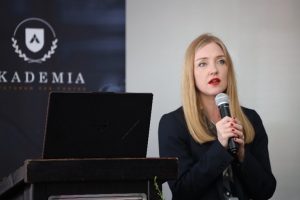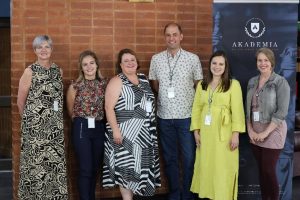The state of Afrikaans in the legal system under the microscope during the Akademia legal symposium
Published on: 21 November 2023
Academics, lawyers and linguists gathered in Centurion, Gauteng, on 16 November to discuss the state of Afrikaans in the South African legal system. These discussions were facilitated by way of a legal symposium which was presented by the Faculty of Law at Akademia, and which was attended by lawyers, academics and language experts.
In her word of welcome, Prof. Hermie Coetzee, dean of the Faculty of Law, explained the purpose of the symposium as a starting point for the development of a study by the Afrikaans Language Board (Afrikaanse Taalraad (ATR)). This study aims to determine the state of Afrikaans in formal and informal administration of justice and follows the publication of “The general demography of Afrikaans research report” (“Die algemene demografie van Afrikaans-navorsingsverslag”) launched in 2022. This report offers reliable and up-to-date demographic data on Afrikaans and is considered a comprehensive source for planning purposes as well as the preservation and further development of language vitality.
“We are gathered here today to reflect on the pursuit of justice against the background of language,” said Coetzee, adding that the symposium represented the first steps to extend the mentioned research specifically to the Afrikaans legal system.
According to Dr Conrad Steenkamp, head of the ATR, the 2022 research represented an important starting point from which Afrikaans speakers would have to work together across all borders to face the consequences of demographic change over the next decades.
Roné Wierenga, project manager and linguistics writer for the Virtual Institute for Afrikaans (Virtule Instituut vir Afrikaans (VivA)) and researcher at the ATR, presented the following important demographic trends (2021-2041) to symposium attendees:
- Strong population growth and migration will increase linguistic diversity in urban areas.
- Afrikaans numbers grow in absolute terms from 7,11 million (2021) to 7,12 million (2031).
- Afrikaans speakers shrink relative to the overall population from 11,7% (2021) to 9% (2041). This contraction can weaken access to government resources.
- The already high levels of anglicisation (around 20 000 Afrikaans speakers per year) are likely to increase and limit the growth of the language.
- The brown/black majority within the Afrikaans language community grows from 59,5% (2021) to 63,8% (2041).
English, nourished by all the indigenous languages, will overtake Afrikaans, the third largest language in the country, from 2022.
Both Steenkamp and Wierenga emphasised that the increasing use of English as the de facto official language in important language domains such as education and the legal system has enormous implications for the preservation and growth of Afrikaans. In order to counter this threat effectively, better cooperation between Afrikaans organisations and networks will have to take place. In-depth discussions between the different Afrikaans language communities will also need to be facilitated. Along with this, the maintenance of Afrikaans’ infrastructure will have to be prioritised by way of research, partnerships with other indigenous languages and thorough language planning and management.
Dr Annelise de Vries, lecturer in Afrikaans and head of languages in the Faculty of Education at Akademia, believes that the super status that is awarded to English in the South African legal context should not be accepted without complaint. According to De Vries, language communities had to start taking action so that greater access to justice can be ensured for all indigenous languages, including Afrikaans.
The importance of indigenous languages, such as Afrikaans, in the legal system was further emphasised by Prof. Russell Kaschula and Dr Zakeera Docrat, both from the University of the Western Cape (UWC), the keynote speakers of the day. The theme of their lecture was: “African languages under siege? Towards a liberated legal system in South Africa”. Kaschula holds the Institutional Chair in Forensic Linguistics and Multilingualism at UWC, while Docrat is currently a National Institute for the Humanities and Social Sciences (NIHSS) post-doctoral research fellow in forensic linguistics (language and law) at UWC.
According to this duo, higher education institutions, such as Akademia, play an important role in terms of the training and development of future legal practitioners. For this reason, the composition and outcomes of, for example, LLB programmes must have a focused multilingual component. This focus must have a bearing on indigenous and international languages, while the addition of interventions such as forensic linguistics must be embraced. Both Kaschula and Docrat praised Akademia et al. in this regard, for its short course: Introduction to forensic linguistics. This course offers law students, legal practitioners, criminologists, law enforcement officers, journalists, language practitioners and behavioural analysts the opportunity to examine language use within the context of judicial processes.
Other considerations that were put forward as building blocks for the establishment of indigenous languages within the legal system include:
- Intellectualisation of indigenous languages with specific reference to the development of own scientific languages.
- Continuing language training for legal practitioners and support staff (police officers, court staff, interpreters and translators).
- Breaking the assumption that the legal system functions within a monolingual (English) environment.
- Building of value-adding partnerships between universities, faculties and researchers.
- Consolidated research in order to build a bridge between the theoretical and practical considerations.
Sensitivity training for persons within the legal system in order to make this sector more accessible and accountable through language.
Docrat closed the symposium by saying that good progress had already been made within the legal system, and that she was excited about the collaborative role of institutions such as Akademia to realise this language endeavour.





